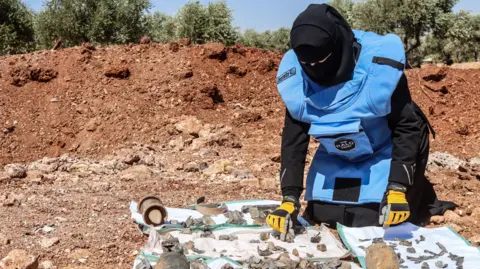Afghans who fled their home country after the Taliban’s return to power in 2021 are pleading for the United States to reconsider a decision cancelling all existing refugee resettlement efforts.
On Wednesday, reactions continued to pour in against an executive order Trump had signed two days prior, on his first day in office.
That order called for the suspension of the US Refugee Admissions Program (USRAP), which processes refugees for resettlement in the country, starting on January 27. All applications and arrivals through the programme have likewise been suspended.
But the sudden halt to USRAP has left Afghan refugees — many already approved to enter the US — in limbo, facing instability and the threat of violence.
Mahnoosh Monir, a former medical student and teacher at a language centre in Afghanistan, fled to Pakistan after the Taliban shut down the school where she worked.
Since taking power, the Taliban has severely restricted women’s rights, even banning their ability to speak in public.
Monir expressed surprise at Trump’s actions in an article published in The Associated Press on Wednesday. She told the news agency women would struggle to “survive” under Taliban rule.
“I didn’t expect this suspension to happen,” Monir said. “A long span of waiting makes us think of very disappointing probabilities, like being sent back to Afghanistan or waiting for a long time in Pakistan as a refugee at risk, which are like nightmares to all of case holders.”
Afghans, some already approved to arrive in the US, are left in limbo after the US president suspends refugee resettlement.
The US ‘owes Afghans a great debt’
Others questioned whether the US was abdicating its responsibility to the Afghans who supported its military presence in the country for two decades.
Thousands of Afghans had worked with US armed forces and the US-backed government during its two-decade-long war in the country. After the collapse of the US-backed government in August 2021, many feared retaliation from the Taliban and hoped to find safe haven in the US.
“President Trump’s decision to cancel the flights of Afghans and other refugees who were cleared and vetted to come to the United States is cruel, ugly and racist,” Arash Azizzada, co-founder of the US-based advocacy organisation Afghans For a Better Tomorrow, told Al Jazeera via text.
“This decision will ensure that Afghans seeking safety could face being targeted, imprisoned, tortured or even worse under a brutal Taliban rule. The United States owes Afghans a great debt, and we will ensure America pays that debt, long after this administration is over.”
Another advocacy group, Afghan USRAP Refugees, published an open letter to Trump and members of the US Congress, calling for action.
“Many of us risked our lives to support the U.S. mission as interpreters, contractors, human rights defenders, and allies,” the letter read.
Even across the Afghan border in Pakistan, it warned that refugees faced dangerous conditions.
“In Pakistan, the situation is increasingly untenable. Arbitrary arrests, deportations, and insecurity compound our distress.”
A great demand
An estimated 15,000 Afghans are currently waiting in neighbouring Pakistan to be approved for resettlement. Some have waited for years and spent countless hours navigating the complex bureaucracy of the US immigration system.
Others have travelled to South America to make the perilous journey north to the US-Mexico border, so they can seek asylum.
The United Nations has called the situation in Afghanistan “one of the world’s most urgent crises”. It projects more than a half million Afghans will need resettlement in 2025.
According to a report from the US Department of State, more than 160,000 Afghans have arrived in the country since August 2021. Still, advocates had criticised the administration of former President Joe Biden for slow-walking decisions on entry.
Trump, who replaced Biden on Monday, had campaigned on a platform of severely restricting immigration into the US. During his first term, from 2017 to 2021, the Republican leader also implemented a ban on entry for citizens of several Muslim-majority countries, leading critics to dub the policy “the Muslim ban”.
In Monday’s executive order, Trump defended his actions as necessary, depicting the US as overwhelmed with arrivals.
“The United States lacks the ability to absorb large numbers of migrants, and in particular, refugees, into its communities in a manner that does not compromise the availability of resources for Americans,” the executive order said.
It is not clear when, or if, USRAP will be resumed. Trump called for a report about the programme at the end of 90 days — and at the end of every 90-day period thereafter, until he determines that the “resumption of the USRAP is in the interests of the United States”.
The announcement has caused anxiety among those in the US, including military service members, with family members still in Afghanistan or in refugee camps.
“I’m just thinking about this all day,” an Afghan American soldier with the US Army’s 82nd Airborne Division, who spoke to the Reuters news agency on condition of anonymity.
His sister remains in the Afghan capital of Kabul. “I can’t even do my job properly because this is mentally impacting me.”

 Afghanistan Peace Campaign
Afghanistan Peace Campaign




